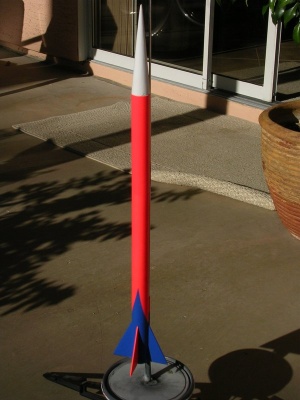| Construction Rating: | starstarstarstarstar |
| Flight Rating: | starstarstarstarstar_border |
| Overall Rating: | starstarstarstarstar_border |

Brief:
Single stage 18mm payloader. Single 12" parachute recovery. 6" long
payload section.
Construction:
The kit contains two sections of body tube: one for the booster and one for the
payload section, four laser cut balsa fins, balsa nose cone, balsa tube
coupler, motor tube, two centering rings, thrust ring, motor retaining hook,
launch lug, screw eye, Kevlar®
cord, elastic cord, 12" colorful plastic parachute, and decals. All
materials were very high quality and some components, such as the motor mount,
parachute, Kevlar®
and elastic cord, all come packed in sub-assemblies making them easier to find
and small parts harder to lose. I ordered my kit directly from Semroc, and it
arrived so well packed in packing peanuts and air bubble packing you could've
dropped an anvil on it and it would've come through OK. Semroc obviously cares
about their products and their customers.
Semroc's instruction booklets are superb. I have built three of their kits and each shows their obvious attention to detail. There is a complete pack list with illustrations and labels for each part, making it easy to be sure everything is there. A nice list of needed tools is on the first page. The instructions are broken down into logical sub-assemblies with check boxes next to each step so you know right where you left off. Each step is well illustrated so there is never any confusion. All the parts fit like they are supposed to, construction was straightforward with only a basic hobby knife, glue of choice, ruler, and sandpaper, required for the build.
Finishing:
There's nothing special about finishing, just follow the directions. Filling
and sanding the balsa takes a little time, but is well worth the effort. I
didn't fill the spiral gaps in the body tube, but you can hardly tell as they
are so smooth anyway. I didn't use the decals, which is just a personal
preference. They really didn't go with my color scheme either. I really like
the long sleek look of the model with the sharp point of the nose cone.
Construction Rating: 5 out of 5
Flight:
I flew it once on each of the recommended motors. All were very good flights,
although I had a little trouble with parachute deployment. This was by no fault
of the kit, however, it just got wrapped too tight and tangled. I used about
five sheets of wadding per flight, the motor hook makes for quick and easy
flight prep and turnaround times for the next flight. It had a little wobble
when launched on the B motor for some reason, the rest of the flights were real
straight the whole way. It didn't quite achieve the altitudes I thought it
might (just by eye-balling it, there was no tracking or altimeter) but then
again, I was launching with my brother who was flying a Quest Aerobee-Hi kit,
so obviously he was getting much higher on the same motors with his smaller,
lighter kit. Overall though, a very pleasing performance.
Recovery:
The Kevlar®
cord is attached to the motor retaining ring and is longer than the booster
section. The Kevlar®
cord and the elastic cord are then knotted together. I really like the Kevlar®,
since whenever the elastic cords go to far down they get burned through. When
the chute did deploy on the last flight, it performed fine with an average rate
of descent. On the flights where the parachute didn't deploy, it came down
sideways and was recovered with no damage. Looks like it will be a durable
rocket that has a lot more flights in it.
Flight Rating: 4 out of 5
Summary:
This is a great second rocket but ease of construction would make it fine for a
first time builder as well. The payload section isn't huge, but I usually don't
fly anything in mine anyway. It would still probably easily accommodate some of
the smaller altimeters though, such as the AA powered one available from Apogee
Components. I haven't found much about the rocket that I don't like yet.
Overall Rating: 4 out of 5
Other Reviews
- Semroc Lune R-1 By Chan Stevens
Brief: This kit was originally produced by Semroc in 1969 as competition to the Centuri Arcon and has been faithfully reproduced today. It's a simple 4-fin construction and with the payload bay, it could be a nice means of venturing out of the basic intro rocket kits. Construction: Ben's review covered the parts fairly well. I'll add that the body tubes are the original ...
 |
 |
Flights
 |
 |
